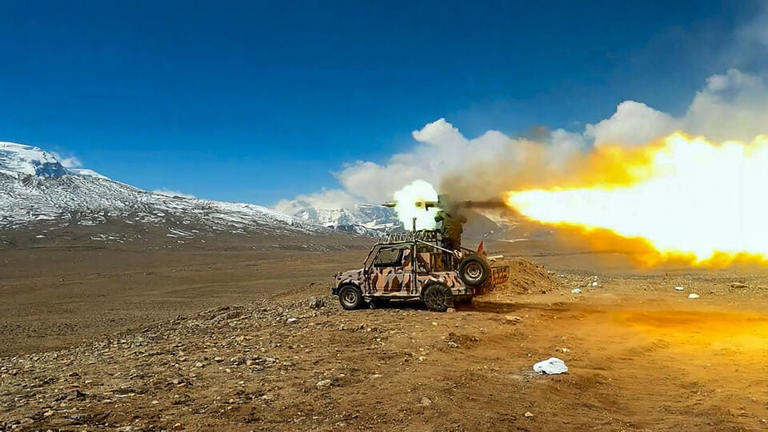Israel Launches Airstrikes on Lebanon After Intercepting Cross-Border Rocket Attacks
Israel launched artillery and airstrikes on Southern Lebanon on Saturday, March 22, following the interception of rockets allegedly fired from across the border. According to reports from the news agency Reuters, the Israeli military stated that three rockets were launched from a district nearly six kilometers north of the border, marking the second such cross-border attack since the US-brokered ceasefire deal in November 2024. In response, the Israeli military conducted artillery strikes and air raids on multiple towns in Southern Lebanon, escalating tensions in the region.
Despite the intense exchange, no casualties were reported from either side. However, the Israeli military warned of severe retaliation for the attack. As per reports, Hezbollah, which has been engaged in hostilities with Israel in past conflicts, did not immediately respond to inquiries regarding the rocket fire.
Saturday’s escalation marks the first time Israel has abandoned the ceasefire in the Gaza Strip, which was originally established against the Palestinian militant group Hamas. Hezbollah, a close ally of Hamas and backed by Iran, has been involved in previous conflicts with Israel. The latest strikes raise concerns about the stability of the ceasefire agreement and the possibility of renewed hostilities between Israel and Hezbollah. This development threatens a fragile truce that ended a prolonged war between Israel and Hezbollah, which had led to significant casualties, including the deaths of Hezbollah fighters and top commanders.
According to Israeli military sources, investigations are underway to determine the source of the cross-border attack that targeted the northern border town of Metula. The incident adds to an already volatile situation in the region, with fears of further escalations.
The November ceasefire deal had mandated that Hezbollah withdraw all weapons from Southern Lebanon, with Israeli troops also required to pull back as the Lebanese army assumed control of the area. The agreement specified that Lebanon’s government would be responsible for dismantling military infrastructure and confiscating unauthorized weapons in the region. Lebanese Prime Minister Nawaf Salam emphasized that all military and security decisions should remain under Lebanon’s authority, reinforcing the country’s stance on maintaining sovereignty over its territory.
Israeli Defense Minister Israel Katz held the Lebanese government accountable for the rocket attacks originating from its territory. He reiterated that Israel would not tolerate attacks on Galilee communities, stating that “the rule for Metula is the rule for Beirut.” His statement underscores Israel’s firm stance on ensuring security in its northern region, despite the ceasefire agreement.
The ceasefire, which initially brought an end to Israel’s bombardment of Lebanon and Hezbollah’s daily rocket attacks into Israeli territory, now appears to be under strain. With tensions rising and military responses escalating, concerns grow over the potential for a renewed full-scale conflict between Israel and Hezbollah.
For more updates and video news coverage, visit our YouTube channel THE OLIGO.

